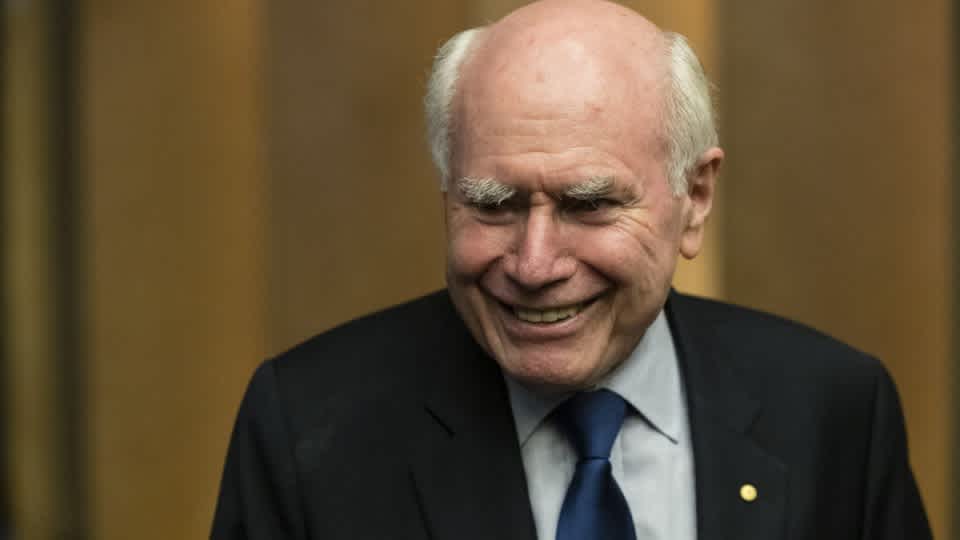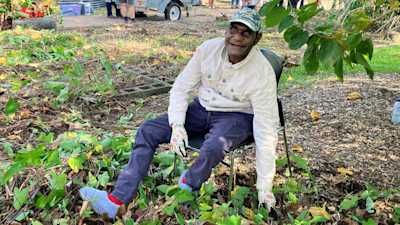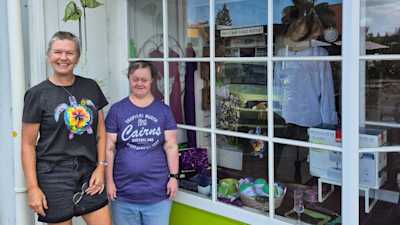Hearing loss can be a devastating experience, it is also a fairly common one in Australia with 1 in every 7 Australians experiencing some hearing loss.

Image: Osher standing against a black background wearing a black t-shirt.
This number jumps as we age, with 3 out of 4 people over the age of 70 experiencing some form of hearing loss.
Hearing loss is not the same as being deaf. The difference between being hard of hearing and being deaf lies in the degree of hearing loss. People typically use being hard of hearing to describe mild-to-severe hearing loss. Meanwhile, deafness refers to profound hearing loss. Deaf people have very little, if any, hearing. Unlike deafness, hearing loss can be supplemented with the use of hearing aids.
Despite hearing loss being common – it can fall under the ‘invisible disability’ category and leave those with it feeling alone.
We have put together a list of prominent Australians who have experience with hearing loss to show that it is not a barrier to having a happy life or successful career.
Osher Gunsberg
A familiar face on TV, this Australian television, radio presenter and journalist is best known for hosting the reality TV series The Bachelor Australia, The Bachelorette Australia and Bachelor in Paradise Australia and he is also the narrator of Bondi Rescue.
Beyond his work in TV and radio, Osher connects with people through his podcasts and social media platforms where he shares stories about life, physical and mental wellbeing, and the challenges of living with hearing loss.
For Osher, permanent nerve damage and hearing loss began after spending his late teens working as a roadie. His hearing continued to decline through his career in the music industry – and he says this affected the relationships he had with his friends and family.
“Before I got my hearing aids, I didn’t know why I was not feeling great about spending time with friends and family. It was because I would ultimately end up just sitting at a restaurant and not hear what anyone was saying. I would feel isolated, and wouldn't get involved in conversations,” says Osher.
“When I started wearing hearing aids, it was intense, because all of a sudden, I was like wow, I can now go out for dinner, and if someone is sitting on the opposite side of the table, I can actually hear what they are telling me.”

Image: Image of John Howard, former Prime Minister of Australia
John Howard
John Howard, Australia’s second longest serving Prime Minister, started using hearing devices when he was just nineteen.
"I was diagnosed with a bad hearing deficiency in primary school when I was about nine," the former Prime Minister said.
Mr Howard said as his hearing deteriorated, he turned to hearing aids - "big ones with cords on it" - until a series of operations in the 1960s restored some of his hearing.
He still wears hearing aids and despite hearing loss leading to a slight speech impediment, he credits his political success to his hearing impairment. Mr Howard said having low hearing encouraged a reliance on memory, as well as causing him to develop an assertive speaking voice to compensate for the lack of hearing.
Elizabeth Richmond
Elizabeth is an opera singer, artist, musician, and she also suffers from hearing loss.
Elizabeth’s hearing loss story is a common one. She noticed her hearing was declining but waited seven years before getting tested. She was then diagnosed with severe hearing loss in both ears and prescribed hearing aids.
"I remember the first time I got fitted with my hearing aids," Elizabeth says.
"I was walking back to my car and there were gum leaves on the ground and for the first time in years I could hear them crunching under my feet; it was breathtaking."
With this improved hearing, Elizabeth could hear how she was singing once more. Elizabeth’s music teacher remarked that her singing standard instantly jumped two grades.
Elizabeth encourages everyone to get their hearing tested and said “…there is no reason why people should continue to strain to hear.”

Image: Black and white photo of Cindy Lu in the pool
Cindy Lu Fitzpatrick
Next on the list is Cindy-Lu Fitzpatrick, one of Australia’s most remarkable swimmers. Over the past two decades she has won 19 gold, 4 silver and 5 bronze medals from the Deaflympics, Commonwealth games and Pan-pacific games. In 2002, she became the only woman to be inducted into the NSW Hall of Champions.
"One of the best things about being a deaf sportsperson is travelling the world and racing with elite deaf athletes." Cindy said.
In 2013, she was voted as one of Australia's Top 100 sportswomen of all time. Now retired, the former swimmer works at the University of Newcastle as an Auslan teacher.

Image: Sam Cartledge on a basketball court spinning a basketball. He is wearing a grey hoodie.
Sam Cartledge
Sam is an Australian representative basketball player and vice-captain of the Australian Men’s Deaf Basketball team ‘the Goannas.’ But life hasn’t always been so easy for Sam, and basketball helped him to socialise.
“Growing up, I was isolated and often left out as I struggled to understand what was being said in conversations at recess and lunch. Instead, I would play basketball as my means of socialising by being competitive on the court with team-mates. I also played representative basketball after school for my local club.”
His love of basketball led to Cartledge representing Australia five times as an athlete so far, notably at the 2012 Asia Pacific Deaf Games in South Korea and at 2 Deaflympics. In 2016, he was granted the title of Deaf Sports Male Athlete of the Year and the MVP of the National Deaf Basketball Club Championship.
Cartledge also works at Australian Hearing, Deaf Sports Australia and Hear For You and spends a lot of his time campaigning for deaf people and sharing his experiences.
“As a member of the deaf community, I understand where you’re coming from. Your struggles were once mine too. My personal experience includes growing up in a hearing world until 6 years ago, when I discovered that I wasn’t the only one!” he said.

Image: Alex Kirchner swimming in a pool
Alex Kirchner
The youngest on our list is 18-year-old Alex, a world-class swimmer who was diagnosed with genetic hearing loss as a baby. He has been swimming for Australia since he was 12 years old and represented Australia at the Deaflympics in 2017. Being an Olympic swimmer was always a goal of Alex’s.
“When I first started swimming, I watched the Olympics and I was like ‘I’m going to be there one day’ and that’s been my goal ever since,” says Alex.
He has come a long way since then, and like a lot of people with disability – found a way to get around any problems his came across.
“It was difficult being hearing impaired,” recalls Alex. “When I first started swimming my mum used to hold my ankle at the start of a race and she would let go when the buzzer went off.”
“Over time I’ve learnt to watch the light on the side of the pool and I can go when that light goes off.”
In 2018, he was named the Australian Male Deaf Athlete of the Year. Kirschner is now a youth ambassador for Deaf Children Australian, inspiring young people to achieve their goals.
If you notice the signs of hearing loss, don’t hesitate to make an appointment to see an audiologist.
You can also take part in an online test before you see your doctor or an audiologist. On the Know Your Noise website, funded by the Australian Government Department of Health, lets you work out whether your hearing might need checking by a professional.


